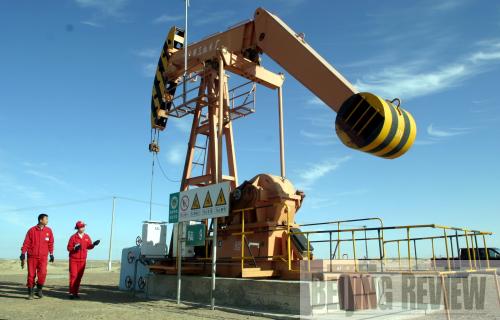|
 |
|
BLACK GOLD: A rig in Karamay pumps up crude in the first oilfield discovered after the founding of People's Republic of China in 1949 (XINHUA) |
China saw its third fuel price hike this year when the National Development and Reform Commission, China's top price regulator, hiked gasoline and diesel retail prices up by 9 percent, effective on June 30. It is the second rally in a month after the country initiated a new fuel pricing scheme in May. The move sparked intense debate around the NDRC's timing, given that the country is striving to recover from economic fallout. Many experts agree with the NDRC's move, citing a sharp rebound in international crude oil prices. But consumers complain about the policy's rate and timing.
Irrational move
Wang Songqi (Deputy Director of the Institute of Finance and Banking under the Chinese Academy of Social Sciences): The recent fuel price hike is bizarre, because in China, refined oil supplies are monopolized by state-owned oil enterprises. Their price adjustments have a common feature: reacting quickly to international crude oil price hikes but slowly to drops. This is irrational.
Chen Hong (General Manager of Beijing-based Elanda Furniture Co.): We can no longer bear the burden of another fuel price hike because the transportation cost is already too high. If the situation remains, we have no choice but to raise prices of our products. Consumers will eventually pay for the fuel price hike.
Guang Zhisheng (Associate professor of economics at Guangzhou-based Sun Yat-sen University): The influence of rising logistics costs is far-reaching. Transportation is not the only industry affected by fuel price hikes. People's living expenses will also be affected by the rising logistics costs if fuel prices remain at a high level.
At present, the world economy is still lingering on the brink of recession, which reduces oil demand. Therefore, international crude oil prices are expected to stop rising and fall again. If crude oil prices remain high, oil-related industries such as plastics and clothing will suffer a lot. These are closely related to people's living standards. A fuel price hike might eventually prop up inflation.
Guo Tianyong (Professor of finance at Central University of Finance and Economics): Now that fuels became much more expensive in China, I expect to see prices of various commodities soar as a result of rising transportation and raw material costs.
The target of the state stimulus package is to expand consumption. But rising consumer prices caused by soaring raw material prices is not a desirable result. It goes against the direction of stimulus policies.
| 